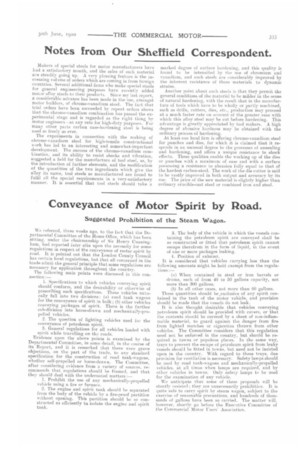Conveyance of Motor Spirit by Road.
Page 7

If you've noticed an error in this article please click here to report it so we can fix it.
Suggested Prohibition of the Steam Wagon.
We referred, three weeks ago, to the fact that the Departmental Committee of the Home Office, which has been sitting, under the chairmanship of Sir Henry Cunningham, had reported inter alia upon the necessity for some regulations in respect of the conveyance of motor spirit by road. It is pointed out that the London County Council has certain local regulations, but that all concerned in the trade admit the general principle that some regulations are necessary for application throughout the country.
The following main points were discussed in this connection :—
1. Specifications to which vehicles conveying spirit should conform, and the desirability or otherwise of prescribing such specifications. These vehicles naturally fall into two divisions : (a) road tank wagons for the conveyance of spirit in bulk; (b) other vehicles conveying packages of spirit. There is the further sub-diyision into horse-drawn and mechanically-propelled vehicles.
2. The question of lighting vehicles used fos the conveyance of petroleum spirit. 3. General regulations for all vehicles loaded with spirit while travelling on the roads. Evidence upon the above points is examined by the Departmental Committee, in some detail, in the course of its Report, and it is remarked that there were grave objections, on the part of the trade, to any standard specification for the construction of road tank-wagons, whether self-propelled or horse-drawn. The Committee, after considering evidence from a variety of sources, recommends that regulations should be framed, and that they should deal with the undernoted matters : 1. Prohibit the use of any mechanically-propelled vehicle using a fire or furnace.
2. The engine and spirit tank should be separated from the body of the vehicle by a fire-proof partition without opening. This partition should be so eonstructed as efficiently to isolate the engine and spirit tank. 3. The body of the vehicle in which the vessels containing the petroleum spirit are conveyed shall be so constructed or fitted that petroleum spirit cannot escape therefrom in the form of liquid, in the event of one or more packages leaking.
4. Position of exhaust.
It is considered that vehicles carrying less than the following amounts might be held exempt from the regaleLions :— (a) When contained in steel or iron barrels or drums, each of from 40 to 50 gallons capacity, not more than 300 gallons. (b) In all other eases, not more than 60 gallons. These quantities should be.exclusive of any spirit contained in the tank of the motor vehicle, and provision should be made that the vessels do not leak.
It is also thought desirable that vehicles conveying petroleum spirit should be provided with covers, or that the contents should be covered by a sheet of non-inflammable material, to guard against the danger from fire from lighted matches or cigarettes thrown from other vehicles. The Committee considers that this regulation need not be enforced in the country, but should be required in towns or populous places. In the same way, trays to prevent the escape of petroleum spirit from leaky vessels should be fitted in towns, but need not be insisted upon in the country. With regard to these trays, due provision for ventilation is necessary. Safety lamps should be used by road tank-wagons and mechanically-propelled vehicles, at all times when lamps are required, and by other vehicles in towns. Only safety lamps to be used for the examination of any vehicle. We anticipate that some of these proposals will be stoutly resisted ; they are unnecessarily prohibitive. It is quite safe to carry spirit by steam wagon, subject to the exercise of reasonable precautions, and hundreds of thousands of gallons have been so carried. The matter will, however, shortly go before the Executive Committee of the Commercial Motor Users Association.






















